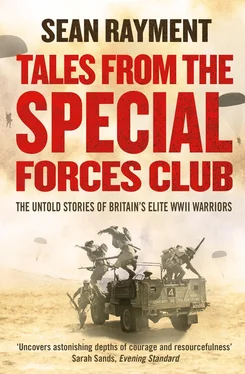‘The officers were very polite, very decent. My attitude was: what the devil are you on about? You can’t possibly win this war. The Russians were well on the go, the US were in the war, Germany was being bombed to hell and it was quite clear what the outcome was going to be eventually. I didn’t say that to them directly, I just implied it, but they wouldn’t have any of it and they wanted us to switch sides and join them. “Germans and British are far too close to be enemies,” they said. Our races were so similar that it was ridiculous that we were fighting one another. That was their attitude. They wanted us to fight against the Russians. Their argument was based on the grounds that the Jews were running our side in the war and that everything could be blamed on the Jews. Our attitude was “Don’t be so bloody silly.”’
By the time the POWs arrived in Athens, Ron Hill and Jimmy were determined to make their escape. Other members of the LRDG had managed to slip past the German guards while being marched through Athens.
‘I, for one, was absolutely up for escaping, especially after a few days in the compound, which I soon became pretty fed up with. Right from the start, Ron and I said we were going to escape. But not before we had some fun with the guards. They were funny little gnome-like men from the Black Forest and they were armed with the most ancient of rifles, great long things which were as tall as they were.
‘We used to make fun of them unmercifully. We would start a bit of a rumpus at one side of the compound and these poor little blokes would start shouting to one another and rush round to one side of the compound where the noise was. Then we would start a similar thing on the other side so they would have to rush back. And we’d sing funny songs to them. At the time, the Americans had a song which had rude noises in it which went like this: “When the Führer says we are the master race we heil, (raspberry noise), heil, (raspberry), right in the Führer’s face. Not to love the Führer is a great disgrace so we heil, (raspberry), heil , (raspberry), right in the Führer’s face.” And these blokes loved it, though they didn’t really understand what was going on.’
After a few days in Athens, rumours began circulating that the POWs were to be transported to Germany, and Jimmy and Ron knew that the opportunities for escape would soon be limited.
‘We were put into cattle trucks with one kilogram of sour black bread and two small tins of Italian bully beef for a four-day journey. There were about 30 of us in each truck, the toilet was a bucket and one poor soul had dysentery, so you can imagine what it was like. As the train went through the villages and towns we were able to plot the route on a silk escape map which was sewn into my beret as part of my escape kit – most people in the LRDG had one. I also had a hacksaw blade sewn into the flies of my trousers and a small button compass hidden in the collar of my battledress tunic. There was no excuse for not at least trying to escape. I had managed to avoid being searched and the Germans never found my escape kit.
‘Inside the trucks there were little openings in the four corners of the carriage which were criss-crossed with barbed wire, so I began sawing away at the barbed wire and then Ron and I took it in turns. The train frequently stopped and we were allowed out to go to the toilet, but we had to do our business in front of all these civilians who were passengers on the train and the whole thing was quite humiliating.
‘The night before we planned our escape two LRDG men on the other truck kicked out some panels and managed to escape but they were later recaptured. The Jerry commander was furious and lined us all up in the morning and was walking up and down, bellowing at us, making all sorts of threats.
‘By now the train had entered Macedonia, and that night, on 6 November 1943, just after we left the town of Veles, 13 days after we were captured, I managed to saw through the barbed wire. Ron and I tossed a coin to see who would get out first and I won. We bent the wire back and I climbed out and was hanging on to the side of the train as we passed through a tunnel, at which point I saw Ron’s boots appearing through the opening and so I jumped. The train was moving at about 25mph but my parachute training helped break my fall and I landed safely.
‘The rest of the train passed and when I saw the red light on the back of the train disappearing into the distance I must say I felt pretty lonely. I didn’t regret getting out at all, I was delighted to be free, but there I was in the middle of occupied Europe all by myself at that stage – Ron still hadn’t jumped out. His jump was delayed and he was quite a little way from me. I walked up the track and found him hiding behind a telegraph pole because he thought I was a guard from the tunnel. Every tunnel and bridge we passed was guarded – but this one wasn’t, fortunately. I spotted Ron and said something like, “Hello Ron, are you OK?” But he’d hurt his leg when he landed. He’d twisted a muscle in his thigh and had taken a couple of chips out of his lower leg when he hit the track.
‘Ron and I used to speak quite openly about escaping and the extraordinary thing was that everyone in that truck could have got out, everyone, but they just didn’t. I think they were just resigned to the fact that they were POWs and that was how they were going to spend the rest of the war. I felt very disappointed that no one else attempted to escape.
‘Ron also had a map in his beret and he gave it to a couple of Scottish commandos who were with us in Y Patrol, but I don’t think they used it. I think it was the shock of capture, and a sort of inertia developed in some people, but not in me. I deeply resented that I was a prisoner and I wasn’t going to put up with it.
‘It was raining, dark and cold. All we had to eat was a few items from a Red Cross parcel we had been given and in front of us was a very long journey through the Macedonian mountains. I asked Ron if he could walk. He said yes, so off we went – into the mountains on a compass bearing – and that was how our escape began.
‘We figured that if we walked on a bearing slightly south of west we would eventually get to the Adriatic Sea, but that meant walking through the whole of Albania. The plan was to get to the Adriatic, steal a boat, row across the Adriatic and get to Italy, which was where the action was. What we wanted was to get back into the war.
‘We didn’t know what Albania was like but we soon found out that the country was really quite mountainous and swarming with enemy soldiers. We didn’t know what to expect so we started off walking at night so that we wouldn’t be spotted by the Germans, but poor old Ron’s leg was getting worse all the time.
‘The going was very rough, steep wooded hills and valleys made all the worse at night. One night we were on an open hillside, very rocky and blowing a gale. There was freezing rain, more like sleet, and we took it in turns with the compass to go on the right bearing. It was my turn to lead and I turned round to see how far behind Ron was and he wasn’t there. I went back to see where he was and he was sitting on a rock. “Sorry, old son,” he said, “I can’t go any further.” I believed him because he was a tough little bloke – quite small was Ron, about five foot six, but very tough. He’d seen active service in the tank regiment before the LRDG and had been injured when his tank was destroyed, so he knew what it was all about.
‘I looked round for somewhere to spend the rest of the night, to see if I could find a dry spot. I found an area where there was an overhanging rock with a dry place underneath it, but with just room for one, so I installed Ron and I went to look for somewhere for myself, which I found but it wasn’t as comfortable. By then I was very, very tired and went to sleep in spite of the conditions. I woke up at first light, freezing cold, and I couldn’t move – I suppose I was close to hypothermia. I started moving my fingers and eventually got movement back in my body and went to find Ron and he was OK, he’d managed to recover a bit, and then off we went again.
Читать дальше












